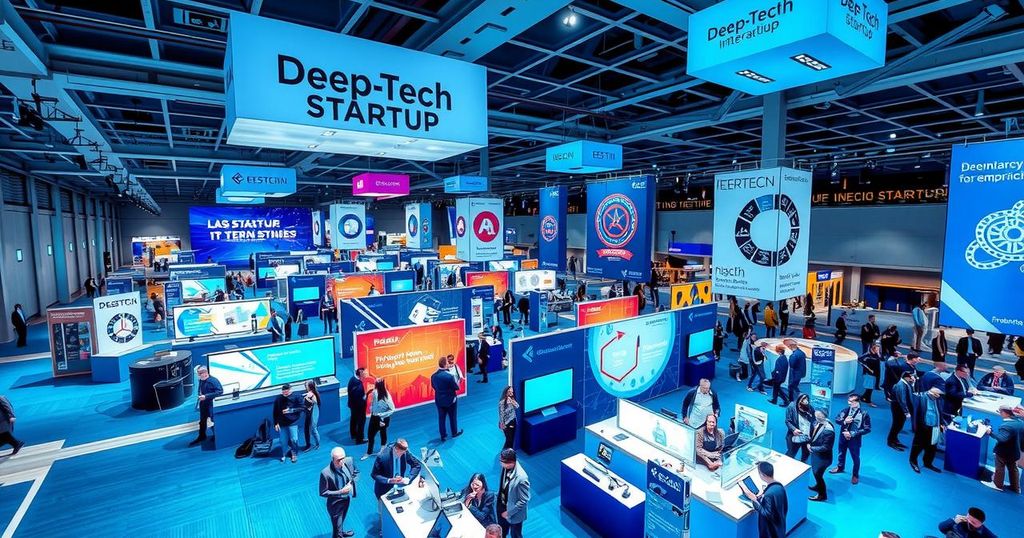AI
Science
ARTIFICIAL INTELLIGENCE, ASIA, CHINA, COUNCIL OF SCIENTIFIC AND INDUSTRIAL RESEARCH, CSIR, DEV, DEVENDRA FADNAVIS, DIGITAL TRANSFORMATION, EK, EKNATH SHINDE, FOR SCIENCE AND TECHNOLOGY, IIT BOMBAY, INDIA, INNOVATION, JI, JITENDRA SINGH, MAHARASHTRA, MEXICO, NES, NORTH AMERICA, PI, PIYUSH GOYAL, PREMNATH, PUNE, SCIENCE AND TECHNOLOGY, SUSTAINABILITY, TR, V PREMNATH, VENTURE CAPITAL, VENTURE CENTRE
Liam Kavanagh
0 Comments
Mumbai’s CSIR Startup Conclave 2025 Focuses on Reviving Deep-Tech Innovation
The CSIR Startup Conclave 2025 in Mumbai gathers startup founders, researchers, and policymakers to discuss challenges in the startup ecosystem, with a focus on deep-tech innovation. The event highlights the increase in startup closures, notably 28,000 since 2023, and the challenges in securing funding. Key discussions will include the importance of government support, mentorship, and protecting intellectual property.
The CSIR Startup Conclave 2025 kicks off at the NESCO Centre in Mumbai, gathering a diverse mix of deep-tech startup founders, researchers, industry giants, and policymakers. Scheduled for May 20 and 21, the event is organized by Pune-based Venture Centre along with CSIR labs based in Pune, Nagpur, and Goa. This two-day conclave arrives at a crucial juncture for India’s startup ecosystem, which has faced major challenges recently.
Notably, the startup landscape has seen a drastic downturn — over 28,000 startups have shuttered since 2023, a staggering increase compared to the 2,300 closures reported between 2019 and 2022, according to Tracxn. Investors report tough times, with fewer unicorns making headlines compared to previous years, and many companies are struggling with securing necessary funding.
Commerce Minister Piyush Goyal recently pointed out the disparity between Indian and Chinese startups. He noted that while Indian businesses are often focused on apps for food delivery and entertainment, China is pivoting towards serious technological advancements in sectors like electric vehicles, AI, robotics, and more. This observation adds an extra layer of urgency to the conclave’s theme of fostering deep-tech innovation.
Dr. V. Premnath, the founding director of Venture Centre, emphasizes that while it’s crucial to develop deep-tech startups, all types of startups play an essential role in the economy. He explained, “Anytime a startup raises investments in money, it leads to entrepreneurial and sometimes innovative activities.” According to him, these innovations, though not explicitly technology-based, can spark broader waves of entrepreneurship and economic activity.
The conclave offers a platform for showcasing a variety of deep-tech startups, many affiliated with leading institutions like IIT Bombay. As Minister Goyal expressed interest in elevating these businesses in an investor-rich environment like Mumbai, Premnath highlighted their potential to create impactful solutions across different societal sectors — from healthcare to agriculture.
Deep tech enterprises, according to Premnath, need strong support to flourish and reach market readiness. He suggests that additional government funding could help. “The government plays a pivotal role through funding options such as BIRAC. But beyond that, the ecosystem must present a strong case for investing in deep tech,” he said, pointing to strategies in other economies where government participation in funding can accelerate growth.
Venture Centre aims to minimize risks for first-time entrepreneurs entering the deep-tech field, who often lack both financial resources and established networks. This incubator provides initial capital that is critical for laying the foundation of budding ventures, making it possible for innovative minds to pursue their ideas without the burden of financial strain.
At the conclave, 14 startups will have the chance to pitch their ideas in a Shark Tank-style format to potential investors, heightening their chances at gaining visibility and funding. The event isn’t just about pitches: startups will also benefit from mentoring sessions covering various topics, from business planning to navigating regulatory hurdles. This holistic approach is intended to pave the way for successful market entry.
A focus on intellectual property (IP) protection will also be a key part of the discussions. Premnath stressed the importance of safeguarding IP rights and ensuring startups can operate without infringing on others’ patents and processes. This underscores a crucial part of making deep-tech ventures viable and sustainable in the long term.
In conclusion, the CSIR Startup Conclave 2025 highlights the urgent need for innovation in India’s deep-tech sector, particularly in light of the increased challenges startups face today. With significant involvement from government officials and a packed agenda that includes pitching sessions and mentoring, the conclave aims to breathe new life into the startup ecosystem. Emphasizing relationships between funding, innovation, and intellectual property rights, it is designed to empower entrepreneurs while pushing for key advancements in technology.
Original Source: indianexpress.com




Post Comment